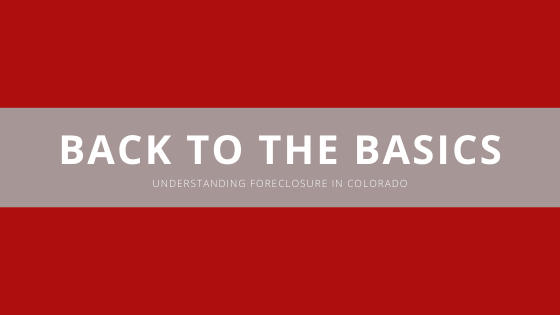Colorado is a nonjudicial foreclosure state, meaning that the lender does not have to go to court to foreclose on your home. The foreclosure process moves quickly and is often completed in 4 months through a public trustee. Initially, when obligating yourself, you signed two core documents when you bought or refinanced your home: a promissory note and a deed of trust. The deed of trust turns the promissory note into a debt secured by a lien (legal claim) on your home. The deed of trust authorizes the lender to foreclose on the property if you default. The deed of trust allows the foreclosure to occur outside of court, under state law.
While homeowners facing foreclosure have the right to be heard under a Rule 120 hearing, such a hearing does not provide much protection. The issues discussed during a Rule 120 hearing are whether borrowers are delinquent and whether the borrower is an active-duty member. The Judge will not listen to any other arguments. Motions for injunctive relief are commonly raised at this hearing, and just as commonly dismissed. However, if a Borrower believes that the delinquency figures are incorrect, or that payments have not been properly applied, this is where that argument needs to be made.
“Show Me the Note” Defense
The “show me the Note” defense fails in Colorado Courts and is irrelevant to a Rule 120 hearing. Prior to 2006, a lender, to succeed on a foreclosure action, had to produce the original Promissory Note or a certified copy to the Public Trustee in order to foreclose on the Note. As such, a “show me the Note” defense would succeed. However, the legislature changed this requirement in 2006. Now, all that is required is a statement from the attorney handling the foreclosure on behalf of the lender that the Lender is the proper party to conduct the foreclosure, either as the Owner or as an agent of the owner. There is no longer any legal requirement to produce the actual Note or a certified copy before the foreclosure commences. In sum, this defense will fail in Colorado.
MERS and Foreclosure
Mortgage Electronic Registration System, Inc. (MERS) is a company created by the mortgage banking industry to simplify the assignment process. In many mortgage transactions, the mortgage company will designate MERS as a nominee for the lender. MERS then acts as an agent for the owner of the loan, but it does not actually possess a beneficial interest in the note. Rather, MERS simply tracks the mortgage for its members while the mortgage is transferred from bank to bank. Once assigned to MERS, the loan can be bought and sold numerous times without recording an additional assignment.
While Colorado law has not specifically addressed this issue, Colorado courts have routinely held that the absence of a proper assignment of mortgage will not stop a foreclosure. If the foreclosing party is clearly entitled to enforce the promissory note secured by the mortgage, the court would likely allow the foreclosure to proceed, regardless of a proper assignment, because of the general rule that “a mortgage follows the note.”
If your house is in foreclosure, contact the Law Offices of Eric L. Nesbitt, P.C. We know local foreclosure rules and will fight to keep your home.
Eric L. Nesbitt, Esq.
Law Offices of Eric L. Nesbitt, PC
Phone 303-741-2354
Email Us
Nesbitt Law Offices Website

